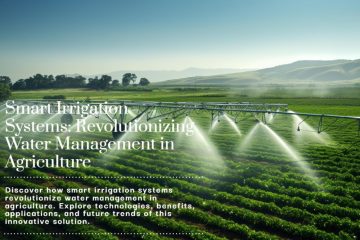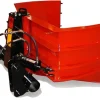
Smart Irrigation Systems – Revolutionizing Water Management in Agriculture
In the realm of modern agriculture, water management stands as a critical factor in ensuring productivity, sustainability, and environmental stewardship. Smart irrigation systems have emerged as a groundbreaking solution, integrating advanced technologies to optimize water usage, reduce waste, and enhance crop yields. This article delves into the intricacies of smart irrigation systems, exploring their technologies, benefits, challenges, applications, and future trends.
Introduction
Water scarcity and efficient resource management have become pressing concerns in today’s world. Agriculture, being one of the largest consumers of freshwater, faces the challenge of optimizing water usage to ensure sustainable food production. Smart irrigation systems offer a viable solution by utilizing technology to deliver the right amount of water at the right time, thereby reducing waste and enhancing crop productivity.
This article aims to provide an in-depth understanding of smart irrigation systems, highlighting their importance, technologies, benefits, applications, challenges, and future trends.
What Are Smart Irrigation Systems?
Smart irrigation systems are advanced irrigation solutions that use technology to optimize water use for agricultural and landscaping purposes. Unlike traditional irrigation methods, which often rely on manual scheduling and control, smart irrigation systems leverage real-time data and automation to deliver precise water quantities based on plant needs, soil conditions, and environmental factors.
How Do Smart Irrigation Systems Work?
Smart irrigation systems operate by integrating various technologies, including sensors, weather data, and automated controllers. These components work together to monitor soil moisture, weather conditions, and plant requirements, allowing for intelligent water management. The system automatically adjusts irrigation schedules and amounts, ensuring optimal water delivery and reducing waste.
Types of Smart Irrigation Systems
- Weather-Based Systems: These systems use weather data to adjust irrigation schedules. They take into account factors such as temperature, humidity, wind speed, and precipitation to determine the right amount of water needed.
- Soil Moisture-Based Systems: Soil moisture sensors measure the amount of water in the soil and trigger irrigation only when moisture levels drop below a predetermined threshold. This approach ensures that plants receive water only when necessary.
- Drip Irrigation Systems: Drip systems deliver water directly to the root zone of plants, minimizing evaporation and runoff. Smart drip systems incorporate sensors and controllers to optimize water delivery.
- Sprinkler Systems with Smart Controllers: Smart sprinkler systems use data from sensors and weather forecasts to adjust watering schedules, ensuring efficient water usage and preventing overwatering.
Benefits of Smart Irrigation Systems
The adoption of smart irrigation systems offers numerous benefits that contribute to sustainable water management and enhanced agricultural productivity.
1. Water Conservation
Smart irrigation systems significantly reduce water wastage by delivering precise amounts of water based on real-time data. By optimizing water usage, these systems help conserve this precious resource, making them ideal for regions facing water scarcity.
2. Improved Crop Yields
By providing plants with the right amount of water at the right time, smart irrigation systems enhance crop health and productivity. Adequate water supply ensures optimal plant growth, leading to improved yields and better-quality produce.
3. Cost Savings
Although the initial investment in smart irrigation technology may be higher, the long-term cost savings are substantial. Reduced water usage translates to lower water bills, and improved crop yields result in higher profits for farmers.
4. Environmental Sustainability
Smart irrigation systems promote environmental sustainability by minimizing water runoff, soil erosion, and nutrient leaching. By conserving water and optimizing resource usage, these systems contribute to a healthier ecosystem.
5. Time and Labor Efficiency
Automation in smart irrigation systems reduces the need for manual intervention, saving time and labor for farmers and landscapers. Remote monitoring and control capabilities allow users to manage irrigation from anywhere, enhancing convenience and efficiency.
6. Precision Agriculture
Smart irrigation systems play a crucial role in precision agriculture, where data-driven decisions optimize farming practices. By integrating with other precision agriculture technologies, such as drones and sensors, smart irrigation enhances overall farm management.
Key Technologies in Smart Irrigation
Smart irrigation systems rely on a range of technologies to achieve efficient water management. Understanding these technologies is essential for comprehending how smart irrigation works and its potential benefits.
Sensors and IoT Devices
Sensors are the backbone of smart irrigation systems, providing real-time data on soil moisture, temperature, humidity, and more. IoT devices facilitate seamless communication between sensors, controllers, and users, enabling data-driven decision-making.
- Soil Moisture Sensors: These sensors measure the amount of water in the soil and provide critical data for irrigation scheduling. They help prevent overwatering and ensure plants receive the right amount of moisture.
- Weather Sensors: Weather sensors monitor environmental conditions such as temperature, humidity, wind speed, and rainfall. This data helps adjust irrigation schedules based on current weather patterns.
- Flow Sensors: Flow sensors detect the flow rate of water in the irrigation system, helping identify leaks and ensuring uniform water distribution.
Weather-Based Controllers
Weather-based controllers use meteorological data to optimize irrigation schedules. They adjust watering times and amounts based on factors such as temperature, humidity, and rainfall forecasts, ensuring efficient water usage.
Soil Moisture Sensors
Soil moisture sensors are critical components of smart irrigation systems. These sensors measure the volumetric water content in the soil, providing valuable data for irrigation decisions. Soil moisture sensors are typically placed at different depths to assess moisture levels throughout the root zone.
Drip and Micro-Irrigation
Drip and micro-irrigation systems deliver water directly to the root zone of plants, minimizing evaporation and runoff. These systems are highly efficient and can be further optimized with smart technologies.
- Smart Drip Irrigation: Smart drip systems use sensors and controllers to regulate water delivery based on soil moisture and plant needs. This approach ensures precise water distribution, reducing waste.
- Micro-Irrigation: Micro-irrigation systems, such as micro-sprinklers and bubblers, provide localized watering for specific plants. Smart controllers optimize water delivery, preventing overwatering and conserving resources.
Wireless Communication
Wireless communication technologies enable seamless connectivity between sensors, controllers, and users. Smart irrigation systems often use Wi-Fi, Bluetooth, or cellular networks to transmit data and receive commands.
Cloud-Based Platforms
Cloud-based platforms store and analyze data collected by smart irrigation systems. Users can access this data through web or mobile applications, allowing them to monitor and control irrigation remotely.
Data Analytics and Machine Learning
Data analytics and machine learning algorithms process the data collected by sensors and other sources. These technologies help identify patterns, optimize irrigation schedules, and improve decision-making processes.
Remote Monitoring and Control
Smart irrigation systems offer remote monitoring and control capabilities, allowing users to manage irrigation from anywhere. Through mobile apps or web interfaces, users can access real-time data, receive alerts, and adjust settings as needed.
Applications of Smart Irrigation Systems
Smart irrigation systems find applications across various sectors, each benefiting from optimized water management and enhanced resource efficiency.
Agriculture
In agriculture, smart irrigation systems play a vital role in improving crop yields and conserving water. Farmers can use these systems to monitor soil moisture, weather conditions, and plant needs, ensuring precise water delivery.
- Row Crops: Smart irrigation is particularly beneficial for row crops like corn, soybeans, and wheat. By adjusting water delivery based on soil and weather data, farmers can optimize growth and reduce water waste.
- Orchards and Vineyards: Smart irrigation systems help orchards and vineyards maintain consistent soil moisture levels, promoting healthy fruit development and reducing water usage.
- Greenhouses: In controlled environments like greenhouses, smart irrigation systems provide precise water delivery, enhancing plant growth and minimizing resource waste.
Landscaping
In landscaping, smart irrigation systems are used to maintain healthy lawns, gardens, and landscapes while conserving water.
- Residential Lawns: Homeowners can use smart irrigation systems to optimize lawn watering, ensuring lush greenery without overwatering.
- Commercial Landscapes: Businesses and public spaces benefit from smart irrigation by reducing water consumption and maintaining attractive landscapes.
- Parks and Recreational Areas: Smart irrigation systems help parks and recreational areas manage water resources efficiently, providing lush greenery for visitors.
Golf Courses
Golf courses require extensive water management to maintain lush greens and fairways. Smart irrigation systems provide precise water delivery, reducing waste and enhancing course aesthetics.
- Turf Management: Smart irrigation systems monitor soil moisture and weather conditions to deliver the right amount of water to turf areas, ensuring optimal playing conditions.
- Water Conservation: By using smart technologies, golf courses can significantly reduce water usage, contributing to environmental sustainability and cost savings
.
Urban Green Spaces
Urban green spaces, including parks, gardens, and rooftop gardens, benefit from smart irrigation systems by conserving water and maintaining vibrant landscapes.
- Community Gardens: Smart irrigation systems support community gardens by optimizing water delivery based on soil moisture and weather conditions.
- Rooftop Gardens: In urban environments, rooftop gardens use smart irrigation to conserve water and maintain plant health, contributing to improved air quality and aesthetics.
- Public Parks: Public parks use smart irrigation systems to maintain lush landscapes while minimizing water consumption, ensuring sustainability and visitor satisfaction.
Challenges in Implementing Smart Irrigation Systems
While smart irrigation systems offer numerous benefits, their implementation is not without challenges. Understanding these challenges is essential for successful adoption and operation.
1. Initial Cost and Investment
The initial investment required for smart irrigation systems can be a barrier for many farmers and landscapers. The cost of sensors, controllers, and installation may be higher than traditional systems, deterring some from adopting the technology.
2. Technical Complexity
Smart irrigation systems involve complex technologies that require technical expertise for installation, operation, and maintenance. Users may face challenges in understanding and managing the system’s components and software.
3. Data Integration and Management
Smart irrigation systems generate vast amounts of data from sensors and other sources. Integrating and managing this data can be challenging, especially for users with limited experience in data analysis.
4. Connectivity Issues
Reliable connectivity is crucial for smart irrigation systems to function effectively. Areas with limited internet access or weak signals may experience connectivity issues, affecting system performance and reliability.
5. Weather Variability
Weather-based irrigation systems rely on accurate weather data for decision-making. However, weather conditions can be unpredictable, leading to discrepancies between predicted and actual conditions.
6. Maintenance and Repairs
Smart irrigation systems require regular maintenance and occasional repairs to ensure optimal performance. Users must be prepared to address technical issues and system malfunctions.
7. Security Concerns
As with any IoT-enabled system, smart irrigation systems face security risks such as data breaches and unauthorized access. Implementing robust security measures is essential to protect sensitive information and ensure system integrity.
Case Studies: Success Stories
Examining real-world examples of smart irrigation systems in action provides valuable insights into their benefits and applications.
Case Study 1: Vineyard in California
A vineyard in California implemented a smart irrigation system to optimize water usage and enhance grape quality. By using soil moisture sensors and weather data, the vineyard reduced water consumption by 30% while improving grape yields. The system’s remote monitoring capabilities allowed vineyard managers to make data-driven decisions, leading to improved efficiency and sustainability.
Case Study 2: Urban Park in Australia
An urban park in Australia adopted a smart irrigation system to manage its extensive green spaces. The system used weather-based controllers and soil moisture sensors to adjust watering schedules, resulting in a 40% reduction in water usage. The park maintained its lush landscapes while conserving resources, demonstrating the effectiveness of smart irrigation in urban environments.
Case Study 3: Large-Scale Farm in India
A large-scale farm in India implemented a smart drip irrigation system to address water scarcity and improve crop yields. The system used soil moisture sensors and remote monitoring to deliver precise water quantities, resulting in a 50% increase in crop production. The farm’s success highlights the potential of smart irrigation systems in enhancing agricultural productivity in water-scarce regions.
The Future of Smart Irrigation Systems
The future of smart irrigation systems is promising, with ongoing advancements in technology and increasing awareness of sustainable water management. Several trends and developments are shaping the future of smart irrigation:
1. Integration with Artificial Intelligence
Artificial intelligence (AI) is expected to play a significant role in the future of smart irrigation systems. AI algorithms can analyze vast amounts of data from sensors, weather forecasts, and historical trends to optimize irrigation schedules and improve decision-making.
2. Enhanced Data Analytics
As data collection and analysis become more sophisticated, smart irrigation systems will offer deeper insights into soil conditions, weather patterns, and plant health. Advanced data analytics will enable users to make informed decisions and further enhance resource efficiency.
3. Expansion in Urban Areas
With increasing urbanization, smart irrigation systems are likely to expand in urban areas, supporting green infrastructure and sustainable city planning. Rooftop gardens, vertical farms, and urban green spaces will benefit from smart irrigation’s water-saving capabilities.
4. Integration with Renewable Energy
Smart irrigation systems can be integrated with renewable energy sources, such as solar panels, to power irrigation operations sustainably. This integration reduces reliance on traditional energy sources and contributes to environmental conservation.
5. Increased Adoption in Developing Regions
As technology becomes more accessible and affordable, smart irrigation systems are expected to see increased adoption in developing regions. These systems offer valuable solutions for addressing water scarcity and enhancing agricultural productivity in resource-constrained areas.
6. Focus on Climate Resilience
Climate change is driving the need for resilient agricultural practices. Smart irrigation systems will play a crucial role in adapting to changing climate conditions, ensuring sustainable water management and crop production.
7. Integration with Precision Agriculture
Smart irrigation systems will continue to integrate with precision agriculture technologies, such as drones and satellite imagery, to provide comprehensive insights into farm management. This integration will enhance decision-making and optimize resource usage.
Conclusion
Smart irrigation systems represent a significant advancement in water management, offering solutions to the challenges of water scarcity, agricultural productivity, and environmental sustainability. By leveraging advanced technologies, these systems optimize water usage, improve crop yields, and contribute to a healthier ecosystem.
As the world faces increasing demands on water resources, the adoption of smart irrigation systems will play a pivotal role in shaping the future of agriculture and landscaping. Embracing these technologies is essential for achieving sustainable water management and ensuring food security for generations to come.
FAQs
1. What is a smart irrigation system?
A smart irrigation system is an advanced irrigation solution that uses technology to optimize water usage based on real-time data, such as soil moisture, weather conditions, and plant needs. These systems automatically adjust watering schedules and amounts to ensure efficient water management.
2. How do smart irrigation systems conserve water?
Smart irrigation systems conserve water by delivering precise amounts of water based on real-time data. By monitoring soil moisture, weather conditions, and plant requirements, these systems minimize water wastage and prevent overwatering.
3. What are the benefits of using smart irrigation systems?
Smart irrigation systems offer several benefits, including water conservation, improved crop yields, cost savings, environmental sustainability, and time efficiency. They enhance precision agriculture by providing data-driven insights for optimal resource management.
4. Are smart irrigation systems suitable for small-scale farmers?
Yes, smart irrigation systems can be tailored to suit the needs of small-scale farmers. While initial costs may be a consideration, the long-term benefits of water savings, improved yields, and reduced labor make them a valuable investment for small-scale agriculture.
5. What technologies are used in smart irrigation systems?
Smart irrigation systems use various technologies, including sensors, IoT devices, weather-based controllers, soil moisture sensors, and drip irrigation systems. These technologies work together to optimize water delivery and enhance resource efficiency.
6. Can smart irrigation systems be used in urban environments?
Yes, smart irrigation systems are highly suitable for urban environments. They are used in residential lawns, commercial landscapes, urban parks, and rooftop gardens to conserve water and maintain vibrant green spaces.
7. What are the challenges of implementing smart irrigation systems?
Challenges in implementing smart irrigation systems include initial costs, technical complexity, data integration, connectivity issues, weather variability, maintenance, and security concerns. Addressing these challenges requires careful planning and expertise.
8. How do smart irrigation systems contribute to sustainability?
Smart irrigation systems contribute to sustainability by conserving water, reducing runoff, minimizing soil erosion, and optimizing resource usage. They promote environmental stewardship and support sustainable agricultural practices.
9. Are there any success stories of smart irrigation systems?
Yes, there are numerous success stories of smart irrigation systems improving water management and crop productivity. Case studies from vineyards, urban parks, and large-scale farms demonstrate the effectiveness and benefits of smart irrigation technology.
10. What is the future of smart irrigation systems?
The future of smart irrigation systems is promising, with advancements in AI, data analytics, urban expansion, renewable energy integration, and climate resilience. These developments will enhance the efficiency and effectiveness of smart irrigation, shaping the future of sustainable water management.










